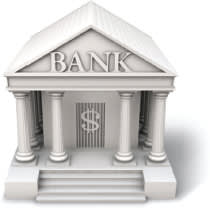business 101
Thinking of Changing Banks?
by William Lynott
Business owners' reaction to the announcement of oppressive new debit card fees caused some banks to back off in a hurry; but rest assured that banks will continue to fish around for more ways to part you and your practice from your money. In fact, they've already discovered some good ones.
If you've been thinking about getting a divorce from your mega-bank, your first job is to make sure that you're not going from the frying pan into the fire. Not every bank will represent a big improvement over your present one, so do your homework by thoroughly investigating banks' policies.
QUESTIONS TO ASK
To find out, here are a number of questions you should ask.
1. Is your new bank on sound financial ground? Log on to bankrate.com for information. Scroll down to “Safe & Sound Ratings” for Bankrates' star ratings.
2. What about fees? Since unreasonable fees at your present bank may be one of the most compelling reasons to consider a change, ask the potential new bank for a complete list of fees.
3. Are there any incentives? Many banks hope to attract small business owners with special offers. Ask about low- or no-fee checking accounts or other offers that may be attractive to you.
4. Does the prospective new bank offer online banking, and is its website intuitive and easy to use?
5. How long will they hold new deposits before making the money available to you for withdrawal?
6. Is use of its ATMs free or will you be paying a charge each time you use one?
7. Will management personnel be available if you have difficult questions or an issue you feel needs attention? How easy will it be to gain access to upper management for a resolution should you have a serious issue?
8. What do friends or associates say about the bank you are considering? As you know from your own practice, the best advertising is word of mouth from satisfied customers.
While much of your research can be done online, there's no substitute for personal contact. A visit with the branch manager of the bank you are considering will give you the opportunity to get a feel for whether or not the chemistry will be right for you. EB
| MAKING THE CHANGE | |
|---|---|

|
Once you've decided that it's time to make a move and found the bank that you feel will make it all worthwhile, the following tips will help to make the job a lot easier. CHECK STATEMENTS. Start by examining at least two recent bank statements from your current account and making a written list of all direct deposits and recurring payments that are automatically being credited or debited. This important first step is necessary for a smooth and painless transition to your new bank. CONTACT DEBITORS/CREDITORS. Once you open an account at your new bank, contact every company on your debitor/creditor list. Ask them to switch their transactions to your new bank. In order for them to start making deposits or debits to the correct account, you'll need to provide them with the new bank's routing number and your new account number. Double-check yourself…the routing number, located on the bottom left of your checks, is always nine digits long. REQUEST SWITCH KITS OR SERVICES. To make it easier, check with the bank to see if they provide a “switch kit” or other help. You can also check with bankswitcher.com. For a small fee, this firm will help you untangle yourself from all the details by providing you with step-by-step instructions, phone numbers, website addresses, and forms to switch all of your automated transactions. OPENING AND CLOSING. It is important to keep both accounts open until you're sure everything has been switched over. Some firms making automatic credits and debits will be much slower than others. If your present account doesn't involve any automatic, outside credits or debits, the job of switching to your new bank will be greatly simplified. |



